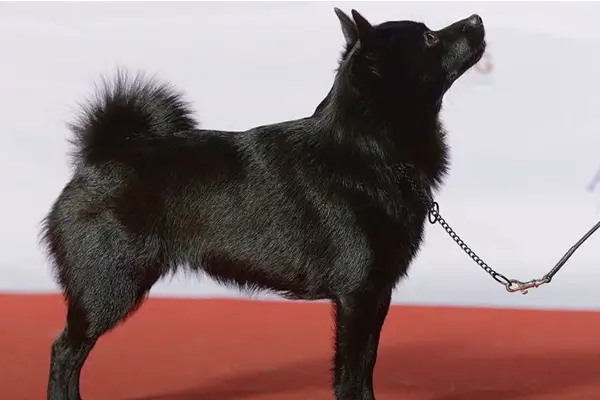Schipperkes are small black dogs that stand at a height of 13 inches. Some people call them Little Black Devils or LBD for short. The Schipperke features a medium-length black coat, fox-like head, small feet, and no tail.
These dogs may be small, but they have big personalities. You shouldn’t get one just because you think they’re beautiful. They can be quite hard to handle, especially for first-time owners. You need to put in the time, patience, and effort; if you’re able to do that, Schipperkes will ensure that your life will always be enjoyable.

Schipperke Breed Statistics
| Dog Breed Group | Non-Sporting |
| Breed Size | Small |
| Height | 11-13 inches (male); 10-12 inches (female) |
| Weight | 10-16 pounds |
| Lifespan | 12-14 years |
Schipperke Breed Ratings
| Energy level | |
| Exercise needs | |
| Requires attention | |
| Playfulness | |
| Trainability | |
| Shedding | |
| Grooming | |
| Friendly with family | |
| Friendly with kids | |
| Friendly with strangers | |
| Friendly with other dogs | |
| Prey Drive |
Schipperke History
The Schipperke is an ancient dog from Belgium whose history can be traced back to several hundred years ago. These dogs are believed to be descendants of black sheepdogs called Leauvenaar.
The Schipperkes were mainly developed to be small watchdogs. Their primary duty is to guard boats in canals between Brussels and Antwerp as shipboard exterminators. Other than that, they were also used to guard barges in city shops.
For years, Schipperkes have been popular as fearless little dogs. They were originally called Spitske, but in 1888, this was changed to Schipperke, which means little captain, and everyone can agree that this is fitting to the dog breed.
From being a watchdog, the Schipperke became a fashionable pet to have when Queen Marie Henriette saw the dogs in a Brussel dog show. And by 1888, the dog breed was finally imported to America.
It took years before the American Kennel Club finally recognized the dog breed in 1904, and now, it currently ranks 105th as the most popular dog in the US. They remain to be excellent family guardians, but they are also great family companions.
Schipperke Temperament
The American Kennel Club describes Schipperkes as confident, alert, and curious dogs. They are always busy, and they prefer running around instead of walking. So, make sure to keep him on-leash whenever you’re taking him out.
Suppose you want him to run around as he please, keep him in a secured yard. But, don’t leave him alone, unsupervised. These dogs are so good at digging and climbing that he might escape the fence.
These dogs are loving and affectionate to family members. However, they also want to do things his way, and this is something you should not allow. You always need to maintain that firm and consistent leadership.
Schipperkes are naturally suspicious of strangers, which makes them excellent watchdogs. These dogs are known to limit the people they trust; this can be their family members who have strong bonds with them.
These dogs are also known to be excellent playmates for children. However, toddlers need supervision all the time. They are also fine with other pets around the house that grew up with him. But their territorial personality will let them drive away any strange pets.
Training might be a challenge because of their stubborn streak. The best way to deal with him is through positive reinforcements. Socialization is highly essential if you want them to become more well-rounded. Get them accustomed to anything new so they won’t quickly react to changes.

Schipperke Care Requirements
- Nutrition: Schipperkes don’t have any special dietary requirements. All you need is to give them high-quality and well-balanced meals daily to help support his daily activities. One meal should contain a balance of essential nutrients like proteins, fats, carbohydrates, and vitamins. Make sure only to choose high-quality ingredients to make a meal for your dog. You can get proteins from animal meat, fats from fish oil, carbohydrates from whole grains, and fiber and vitamins from fruits and vegetables. If you’re planning to buy dog food, get the premium quality ones. Like any other small dog breeds, Schipperkes are easy to overfeed, resulting in overweight. So make sure to watch out for the number of calories you’re feeding your dog daily. You can ask your vet for advice regarding this.
- Grooming: The Schipperke’s black and beautiful coat sheds seasonally. It will need a thorough weekly brushing if you don’t want accumulated dead hair. During the shedding season, you would need to do it more frequently to keep shedding under control. Baths can be given occasionally or as needed, but make sure that their ears are cleaned out regularly. Nails should be checked and trimmed regularly as well. Long nails will cause pain and discomfort, and we don’t want that for our dogs.
- Exercise: Schipperkes are active little dogs. Because they are highly energetic, they need a lot of exercise so they can release this energy. If not given an outlet where he can spend his time running, chasing, and playing, they can cause problems inside your homes. So, make sure to take him out for walks on-leash daily. If you don’t want that, let them run around and play in your backyard. Just make sure that it’s secured and keep close supervision to your dog always. You’d be surprised at what they can do once you turn around. They might start digging up your yard or climb up the fence for escape. They might also chase small animals that come to their domain. So, always keep an eye on them.
- Health: Schipperkes are generally healthy dogs, especially when given the right care and nutrition. However, as dog owners, it’s also best to be aware of what diseases affect these dogs so we can prevent them. Bone diseases such as Legg-Calve-Perthes disease and patellar luxation are very common to the breed. This is why regular exercise is highly necessary. Autoimmune thyroiditis, epilepsy, and mucopolysaccharide type IIB are also health conditions that can affect this dog breed. It’s advisable to meet at least one of your dog’s parents if you wish to be aware of diseases that your dog may inherit. There are also screening tests your dog can take to detect certain health conditions early. Don’t forget to pay close attention to any symptoms or changes in your dog’s behavior. Also, make sure to take him to the vet immediately if there are changes.
- Lifespan: The life expectancy of Japanese Chins is 12-14 years.
Famous Schipperkes
- Ginger: The Schipperke of Lucille Ball and Desi Arnaz
Fun Facts about Schipperkes
- The Schipperke originated from Belgium in the 1600s.
- They were developed to be shipboard exterminators.
- These dogs only come in black color; hence the nickname Little Black Devils.
- They were originally called Spitske before the name change in 1888.
- Their name “schipperke” means “little captain.”
- The Schipperke was declared the national dog of Belgium in the 19th century.
- Queen Marie Henriette of Austria had one; this brought the Schipperke from being a working dog to a status symbol.
- The American Kennel Club recognized the dog breed in 1904.
Check Out Other Non-Sporting Dog Breeds:
American Eskimo Dog, Bichons Frises, Boston Terrier, Bulldog, Chinese Shar-Pei, Chow Chow, Coton de Tulear, Dalmatian, Finnish Spitz, Keeshonden, Lhasa Apsos, Lowchen, Norwegian Lundehund, Shiba Inu, Tibetan Spaniel, Tibetan Terrier, Xoloitzcuintli
